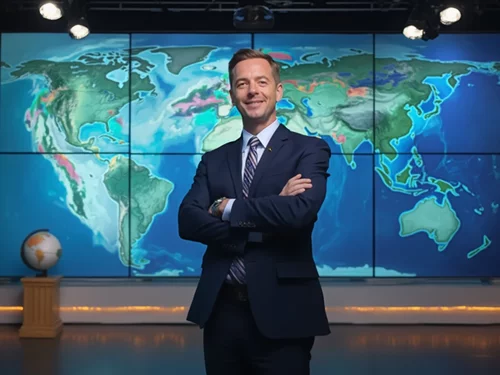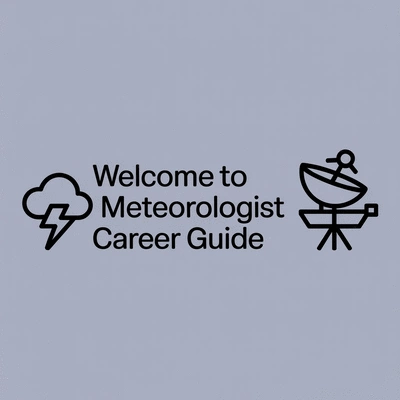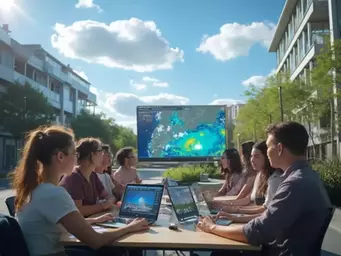As the demand for meteorologists grows, so does the significance of effective interview preparation. Understanding the nuances of the interview process can set you apart from other candidates. Let’s explore how to equip yourself for success in this exciting field!
What You Will Learn
- The core importance of thorough interview preparation in showcasing your meteorological expertise.
- Different interview formats you may face, including one-on-one and panel interviews.
- Key educational qualifications needed to stand out in the meteorology job market.
- Essential strategies to enhance your interview performance, such as researching the company and practicing responses.
- The value of continuous learning and staying updated on industry trends to remain competitive.
- Networking opportunities available through professional organizations and events in the field of meteorology.
Key Interview Preparation Strategies for Aspiring Meteorologists
Success in meteorology interviews hinges on a strategic approach, encompassing various preparation facets. The visual below outlines key areas aspiring meteorologists should focus on.
Interview Formats & Expectations
- One-on-One Interviews
- Panel Interviews
- Practical Assessments
Tailor responses to format.
Key Education Requirements
- Bachelor’s Degree (Meteorology/Atmospheric Sciences)
- Advanced Degrees (Master’s/Ph.D.)
- Relevant Coursework (Physics, Climatology, Data Analysis)
Foundation for technical questions.
Essential Interview Tips
- Research the company
- Review common questions
- Practice responses (mock interviews)
- Prepare questions for interviewer
Demonstrate enthusiasm & commitment.
Continuous Learning & Trends
- Online courses & workshops
- Industry publications & journals
- Professional networking events
- AI/ML in forecasting, climate science demand
Stay competitive & informed.
Understanding the Meteorologist Job Interview Landscape
Entering the world of meteorology is an exciting journey, but it all begins with one crucial step: the interview process. As someone deeply passionate about fostering the next generation of weather scientists, I can assure you that interview preparation is essential for aspiring meteorologists. It not only enhances your confidence but also equips you with the skills needed to showcase your expertise and enthusiasm for weather science.
In Australia, where the weather can change rapidly, being prepared to discuss your knowledge and experiences during an interview is a game-changer. Whether you're a newcomer or a career changer, understanding what to expect can set you apart from other candidates. So, let’s dive into the elements that make up the meteorologist job interview landscape!
The Importance of Interview Preparation for Meteorologists
Preparation is the backbone of a successful interview. When it comes to meteorology, being well-prepared means you can effectively demonstrate your understanding of atmospheric science and your ability to analyze weather data. Here are some reasons why preparation should be at the top of your list:
- Confidence Boost: Familiarizing yourself with common questions can help you respond with ease.
- Knowledge Showcase: Preparation allows you to highlight your education and experience meaningfully.
- Understanding the Role: Knowing what the employer seeks will enable you to tailor your answers to their needs.
Remember, the interview is not just about answering questions; it's also an opportunity to express your passion for meteorology and how you can contribute to the field.
Common Interview Formats and Expectations
Interviews for meteorologist positions can vary widely in format. Understanding the structure can help you prepare effectively. You might encounter:
- One-on-One Interviews: A direct conversation with a hiring manager or team lead.
- Panel Interviews: A group of interviewers from different departments asking questions.
- Practical Assessments: Tasks that test your forecasting abilities or data analysis skills.
Each format has its own set of expectations. For instance, in a panel interview, your ability to engage with multiple people simultaneously is crucial. Practice articulating your thoughts clearly and concisely — it can make all the difference!
Key Education Requirements for Aspiring Meteorologists
To stand out in the competitive field of meteorology, having the right educational background is essential. Most employers look for candidates with specific qualifications that demonstrate their knowledge and expertise. Here’s what you should consider:
- Bachelor’s Degree: A degree in meteorology, atmospheric sciences, or a related field is a must.
- Advanced Degrees: A master's or Ph.D. can enhance your qualifications, especially for research positions.
- Relevant Coursework: Subjects like atmospheric physics, climatology, and data analysis are vital.
The right education not only provides foundational knowledge but also prepares you for the technical questions you’ll face in interviews. As you explore your options, remember to consider universities that align with your career goals!
Pro Tip
Did you know? One of the most effective ways to prepare for your meteorologist interview is to create a personal weather portfolio. This portfolio can include your past projects, forecasting examples, or even a blog where you analyze weather patterns. Not only does this showcase your skills, but it also demonstrates your passion for meteorology and commitment to ongoing learning!
Summarizing Key Preparation Strategies for Success
As you step into the world of meteorology interviews, it's crucial to have a solid game plan. Drawing from my experience at the Meteorologist Career Guide, I've compiled a few essential interview tips that can significantly enhance your chances of success. Here are some key strategies to remember:
- Research the company: Understand their mission, values, and recent projects.
- Review common interview questions: Familiarize yourself with both technical and behavioral questions.
- Practice your responses: Conduct mock interviews to boost your confidence.
- Prepare questions for the interviewer: Show your interest in the role and organization.
By following these steps, you can walk into your interview prepared and ready to showcase your passion for meteorology. Remember, preparation is not just about knowing the answers; it's about demonstrating your enthusiasm and commitment to the field!
Encouraging Continuous Learning and Skill Development
The field of meteorology is ever-evolving, and as aspiring meteorologists, we must embrace continuous learning. This means actively seeking out opportunities to expand your knowledge and skills. Here are a few ways to ensure you're always learning:
- Enroll in online courses or workshops related to the latest meteorological technologies.
- Stay updated with industry publications and journals to keep abreast of new research.
- Participate in local meteorological society events or webinars to network and learn.
- Engage in hands-on experiences, such as internships or volunteer opportunities, to apply your knowledge.
By committing to ongoing education and skill enhancement, you'll not only improve your interview performance but also position yourself as a competitive candidate in the job market.
Exploring Industry Trends and Job Market Insights
Understanding the landscape of the meteorology job market is essential for your career development. As someone deeply invested in this field, I encourage you to keep an eye on current trends and shifts. Here are some key trends to watch:
- Increased demand for climate scientists as climate change becomes a prominent issue.
- Advancements in technology, such as AI and machine learning, in weather forecasting.
- Greater emphasis on public communication skills to explain complex data to non-experts.
- Growth in renewable energy sectors that require meteorological insights.
By staying informed about these trends, you can better tailor your skills and experiences to meet the demands of potential employers, setting yourself up for success in your meteorology career!
Taking the Next Steps in Your Meteorology Career
Resources for Further Learning and Preparation
As you continue your journey toward becoming a meteorologist, it’s essential to utilize the right resources. Here are a few that I recommend:
- The National Weather Service (NWS) offers comprehensive career information, including details on meteorologist roles.
- Online courses through reputable educational websites like Coursera or edX.
- Industry-specific books and journals that provide in-depth knowledge of meteorological concepts.
- Podcasts featuring interviews with professionals in the field.
These resources can provide you with valuable information and practical skills necessary for your future career!
Joining Professional Networks and Communities
Networking is vital for any career, and meteorology is no exception! Engaging with professional networks can open doors to invaluable opportunities. Here’s how you can get involved:
- Join organizations like the Australian Meteorological and Oceanographic Society.
- Participate in local meetups or online forums dedicated to meteorology.
- Attend conferences to meet industry leaders and learn from experts.
- Connect with fellow meteorology students and professionals on LinkedIn.
Being part of these communities can provide support, advice, and collaborative opportunities, greatly enhancing your career prospects.
Finding Opportunities through Job Boards and Networking Events
In today’s job market, finding the right position can often feel overwhelming. However, leveraging job boards and networking events can significantly ease this process. Here are some strategies to help you:
- Utilize job boards like Seek and Indeed tailored to meteorology and environmental science roles.
- Attend career fairs to meet potential employers face-to-face.
- Follow companies you're interested in on social media to stay informed about job openings.
- Network with alumni from your university who are now working in meteorology.
By actively seeking out job opportunities and networking, you’ll be one step closer to achieving your dream career in meteorology!
Frequently Asked Questions About Meteorologist Interviews
- 1. What educational qualifications are required to become a meteorologist?
- Most meteorologist positions require a Bachelor’s Degree in meteorology, atmospheric sciences, or a related field. Advanced degrees (Master’s or Ph.D.) can be beneficial, especially for research-focused roles, along with relevant coursework in physics, climatology, and data analysis.
- 2. What are the common interview formats for meteorologist positions?
- You may encounter one-on-one interviews with a hiring manager, panel interviews with multiple department representatives, and practical assessments designed to test your forecasting or data analysis skills. Being prepared for each format is crucial.
- 3. How important is continuous learning in the field of meteorology?
- Continuous learning is essential due to the ever-evolving nature of meteorology. Staying updated with online courses, workshops, industry publications, and professional networking events helps you remain competitive and informed about new technologies like AI/ML in forecasting.
- 4. What kind of questions should I prepare for in a meteorologist interview?
- You should prepare for both technical questions related to atmospheric science, data analysis, and forecasting, as well as behavioral questions about your problem-solving skills, teamwork, and communication. Practicing responses and conducting mock interviews can be very helpful.
- 5. How can I stand out in a meteorologist interview?
- To stand out, research the company thoroughly, prepare thoughtful questions for your interviewers, showcase your passion for meteorology, and demonstrate your commitment to continuous learning. Creating a personal weather portfolio can also highlight your practical skills and dedication.
Recap of Key Points
Here is a quick recap of the important points discussed in the article:
- Preparation is Essential: Familiarize yourself with potential interview questions and tailor your responses to demonstrate your knowledge of meteorology.
- Understand Interview Formats: Be prepared for one-on-one, panel, and practical assessments, adjusting your approach as needed for each format.
- Educational Background Matters: A degree in meteorology or related fields is crucial, along with relevant coursework to showcase your expertise.
- Research and Practice: Know the company, review common questions, and conduct mock interviews to build confidence.
- Continuous Learning: Stay updated with the latest industry trends, technologies, and opportunities to enhance your skills.
- Networking is Key: Engage with professional organizations and attend events to connect with industry peers and mentors.









